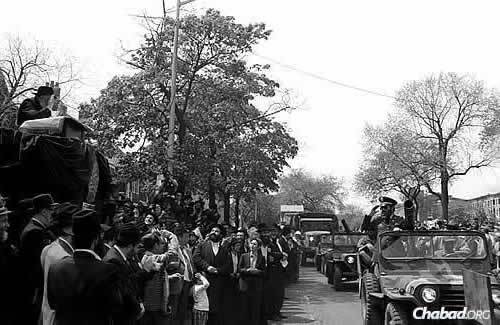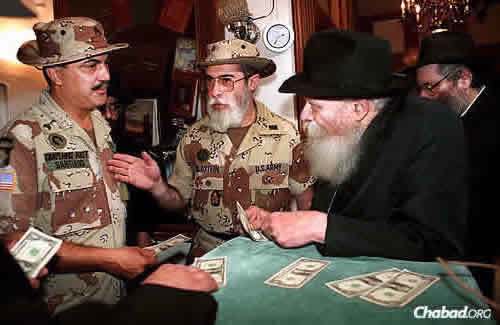Thirty-eight years ago, Rabbi Jacob Goldstein enlisted in the U.S. Army as a chaplain. After serving with distinction as the highest-ranking Jewish chaplain for decades, he recently retired amid pomp and circumstance in Fort Myer, Va. While the ceremony is normally reserved for those on active duty, the chief chaplain made sure that Col. Goldstein was included in the proceedings. On his way back home to Brooklyn, N.Y., he shared some highlights of his colorful and very necessary career.
Q: Nearly 40 years in the army is a very long time. Did you plan on doing this for so long?
A: Never in my wildest dreams did I imagine that I would serve for so long—nor did I ever see myself in the military in the first place.
Q: Why did you choose that particular branch of the military?
A: Because Army is the best, of course. In all seriousness, it began in 1967 when the Rebbe—Rabbi Menachem M. Schneerson, of righteous memory—initiated the tefillin campaign. I began visiting a military base and putting on tefillin with the Jewish fellows. This continued after I got married in 1969.
At one point, a chaplain—a Roman Catholic priest—asked for the address of my bishop so he could request that I enlist. He didn’t end up writing to the Rebbe, but I consulted with the Rebbe, and the rest is history.
Q: How involved was the Rebbe in your career?

A: I would say that I never made a major decision without the Rebbe’s knowledge and guidance.
There were times when he would give me very specific missions. For example, in 1983, I was in Grenada over Chanukah. The Rebbe requested that I inquire about the welfare of the Jewish residents of the island, make an effort to lay tefillin on every Jewish soldier and, if possible, give Chanukah gelt (monetary gifts) to the soldiers. I was also tasked with printing a Tanya there.
And then there was the well-known example of how the Rebbe predicted what would happen to me during the first Gulf war in 1991.
[Iraqi President] Saddam Hussein was threatening to bomb Israel, and there was talk of Jews being gassed in Israel. My mother, who lived in New York, was a Holocaust survivor, and she was very agitated. I had just gotten mobilized and decided to bring her to the Rebbe to see if he could calm her down. Before she could say a word, the Rebbe told her that there was nothing to worry about; Israel would be safe.
Then, the night before I was called up, I went to the Rebbe again. I had been called up for a whole year and was supposed to go to Saudi Arabia. It was just before Chanukah. Thinking ahead, I told the Rebbe that I was taking along a Megillah to read on Purim. The Rebbe told me: “A Megillah will be there, and you will not need to read it.” And he gave me a blessing. I had no idea what that meant. How would there be a Megillah in Saudi Arabia, and who would possibly be able to read it there besides me?
The next morning, I was told that I had been reassigned to Israel.
At a later point my father-in-law, the late Rabbi Dovid Edelman, asked the Rebbe that I return home soon. The Rebbe looked at him and said: “What is the rush? He’s bringing the Sons of Noah close [to G‑d]!”

Q: Looking back, what are some accomplishments that you would single out?
A: When I originally enlisted, I had quite a difficult time because of my refusal to shave my beard. Thank G‑d, we’ve overcome that challenge, and there are a number of bearded chaplains, including Rabbi Menachem Stern, who’s on active duty.
Beyond that, another thing that comes to mind is that we now have kosher MREs (“meals ready to eat”) for Jewish servicemen and women.
And there are the many people whose lives a chaplain touches in ways you can only imagine.
Q: Can you share an example?
A: This takes us back to “Operation Iraqi Freedom,” when I was in Iraq in 2003. I was going through Basra, which is hot, very hot, and uncomfortable. In Camp Bucca—a huge prison for Iraqi prisoners of war—there were Jewish military police, and I had gone to visit them. In the morning, we gathered together a minyan of guys and began services. All of the sudden, a Jewish female soldier showed up and wanted to participate. We were outside in the desert, with no walls or anything that could possibly serve to separate males and females as halachah (Jewish law) requires. I was at a loss for a moment. Then I asked my assistant to go to the ammo dump and bring back a load of artillery shells. We took the shells and fashioned a mechitzah (partition), and she was able to join the services.
Today, that woman recently retired from the military and is a fully observant Jew. Her children live in Israel, and she plans to join them there. She told me that she knew nothing about Judaism when she showed up that morning in Basra, and it was the determination to include her that changed her life. We made it our business to make her feel welcome, and that opened the door for her family’s entrance to Jewish observance.

Q: After such an involved and fulfilling career, why did you remain in the reserves, not enlisting for active duty?
A: After my service in Grenada, the Grand General asked the Rebbe the same thing (there was correspondence between them, as the Rebbe thanked him for facilitating the publishing of the Tanya there). The Rebbe replied that my parents were elderly Holocaust survivors, and they needed me close by. From that I understood that my mission was to be near my parents—something I did until my mother passed away two years ago.
Q: Is there a specific assignment that you would say is most memorable?
A: Every one is different. Each experience is different. Some are more dangerous, and others were touching in other ways. I was in Bosnia, which touched me in one way, and then I went to the U.S. South after Hurricane Katrina and oversaw 200 chaplains there, which was a whole different world. Then there was 9/11 and “Ground Zero,” where I was the chief chaplain, impacting people in a whole different way. Each mission was unique, and each was significant at that time.










Join the Discussion